Sep 2018 2nd Edition
Sep 2018 2nd Edition vuyelwan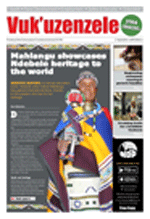
Translations
All you need to know about starting a B&B
All you need to know about starting a B&B vuyelwan Do you want to earn an income by providing accommodation to tourists, giving them the best possible stay during their visit to your area?
Do you want to earn an income by providing accommodation to tourists, giving them the best possible stay during their visit to your area?
Bed and breakfast (B&B) establishments are one of the most rewarding ways to become a business owner within the tourism industry. Here is all you need to know about starting your own B&B.
What is a B&B?
According to the Tourism Grading Council of South Africa, B&Bs provide more informal accommodation with limited service that is provided in a private home.
Each room must have exclusive use of bathroom facilities, and breakfast must be included in the accommodation rates. In addition, servicing of the room needs to take place every day of your guest’s stay.
B&Bs can only have a maximum of three guest bedrooms. If you offer more guest rooms than this, then your establishment needs to be described as a guest house.
What processes do you need to follow to start your own B&B?
The first step you need to take is to approach your local municipality to apply for zoning permission to use your property as an accommodation establishment. You may need to gain permission from neighbouring property owners, and to display notifications to inform the public, should they want to lodge objections.
When you do get approval from the municipality, you will be required to meet certain legal requirements.
Important things to consider
Location – The location of your bed and breakfast is extremely important. If you live in an area that doesn’t attract tourists, then it will be difficult to make a success of your business.
Finances – Tourism can be highly seasonal, so you will need to have sufficient savings to carry you through quiet periods of the year.
A new lifestyle – Your lifestyle will change dramatically when you become the owner of a B&B. You will often need to wake up early and go to bed late, and you will have to adapt to guests sharing your home. You will also need to pay attention to maintenance and keeping your guests satisfied at all times.
Marketing your B&B – The accommodation industry is highly competitive, so you will need to invest some time and money into marketing your B&B. You will need to think about creative ways of advertising your business.
For more information call the Tourism Grading Council on 011 895 3000
Birds eye view of Soweto for Tourists
Birds eye view of Soweto for Tourists tsoanaTourism Month
When innovation meets excitement a lucrative aviation company takes to the skies.
Wiseman Ntombela has a passion for Soweto’s blue skies which has driven him to open his own tourism aviation company called Fly SA Wise.
Ntombela was concerned that tourists frequent Soweto a township in Gauteng, but never get to see the whole township only spending time on Vilakazi Street where the house of the late former President Mandela is situated.
He did research on how he could get visitors to see the whole township within a short space of time, and the only solution was a helicopter.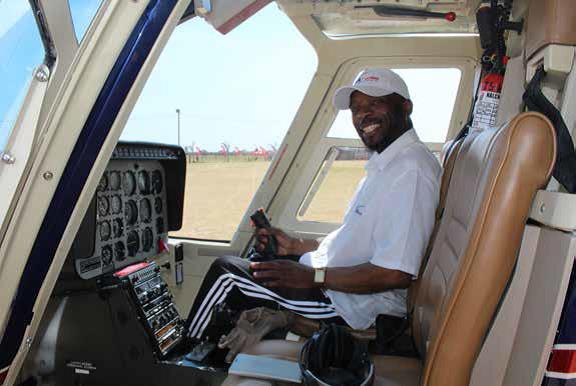
“I started having talks with helicopter and aviation companies and they agreed that this is a good idea,” he said.
In 2016, Fly SA Wise became operational offering visitors a bird’s view of the iconic township with a cost of R250 for a 15 minutes helicopter ride.
“We have different prices depending on the experience that the client requires. Apart from flying over Soweto, we also fly our clients to Kruger National Park and the Mandela Museum in the Eastern Cape,” he added.
Over the years the company has expanded on services that it renders and it now flies clients to different places for breakfast and lunch.
The company has also collaborated with other companies that offer experiences such as air balloon, sky diving, and private game reserves.
In order to promote South Africa to the world, the company also uses technology to livestream experiences of its clients, sharing this on different social media platforms. “This enables people in different countries to see what the tourists are experiencing in South Africa and in a way we are taking South Africa to the world,” said Ntombela.
This acompany which has also created four permanent jobs and ten casual also won R200 000 during the 2018 Gauteng Township Entrepreneur Awards for tourism innovation
Carving out a better future
Carving out a better future JoyYoungsters from a rural Mpumalanga community are crafting a living for themselves as furniture makers, thanks to a learnership, state funding and self-initiative.
A few years ago, government encouraged young people to establish co-operatives to help address issues of youth unemployment, inequality and poverty.
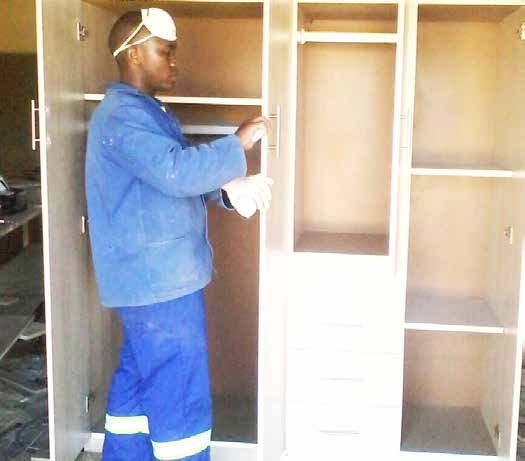
It also put measures in place to ensure that once these co-operatives are established, they get funding from various state entities and the private sector.
A group of young people from Diepdale in Mpumalanga heeded the call and started Themba Labasha Furniture Primary Co-operative Limited, which is gradually changing their lives and creating jobs for fellow community members.
They use solid wood, laminated pine and pine board to make furniture for clients, including clinics, schools, hospitals and individuals.
One of the co-owners of the co-operative, Manqoba Ngwenya, spoke to Vuk’uzenzele about how it all started and the progress made so far.
Themba Labasha means hope for young people
“We came up with the name because most young people in our community are unemployed and poverty is real. So we had to be strategic about our brand because we envisioned owning a company that would create jobs,” he explained.
The co-operative was started by nine young people in 2014.
“We had just completed a carpenter learnership with Komatiland Forests and the co-operative was our answer to the question: ‘What now?’” he said.
Five of the original nine are still involved and two of these are women.
After registering the co-operative, Themba Labasha applied for funding and received R50 000 from the National Youth Development Agency to purchase material.
The co-operative hired three more people on a temporary basis and hopes to create more jobs in the future.
“However, we need more machinery in order for our business to grow. We also need vehicles so that we can deliver our products to our clients.”
The co-operative recently won an award in the forestry excellence category of the 2018 Youth in Agriculture, Forestry and Fisheries Awards and
walked away with a prize of R100 000.
For more information about funding from the NYDA call 0800 52 52 52
Closed clinic transformed into pre-school
Closed clinic transformed into pre-school JoyThe old Newlands Clinic in Cape Town has been given a new lease on life, after being converted into a pre-primary school that caters to 125 children between the ages of three and six.
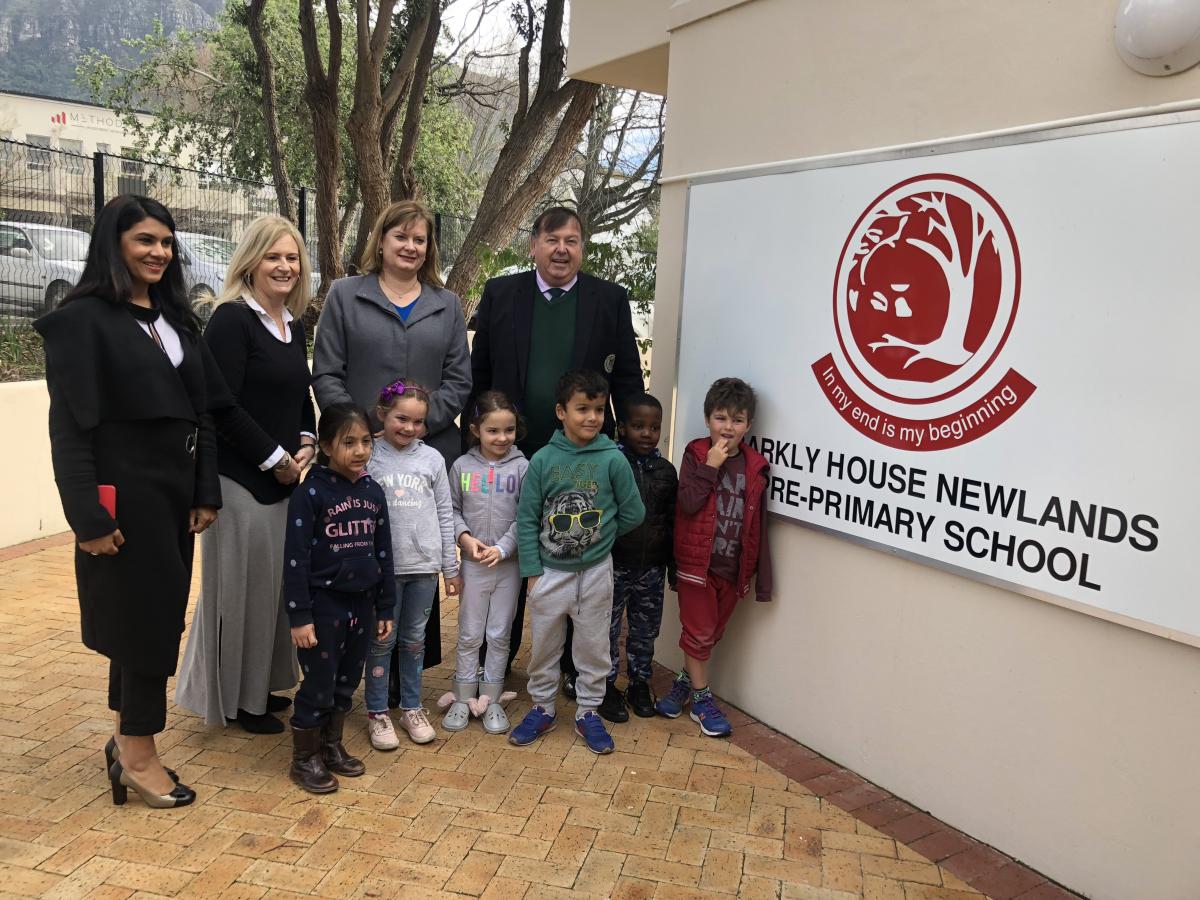 The Western Cape Government saw the opportunity to give the children of Barkly House Pre-Primary School a better learning environment, converting the closed-down Newlands Clinic into new premises for a school, at a cost of R10.2 million.
The Western Cape Government saw the opportunity to give the children of Barkly House Pre-Primary School a better learning environment, converting the closed-down Newlands Clinic into new premises for a school, at a cost of R10.2 million.
Facilities at the converted and modernised new building include five classrooms, a science block, a music room and aftercare facilities.
The Western Cape Department of Transport and Public Works called on award-winning female architect Rahdia Katieb Parker to lead the transformation.
Parker is the co-founder of Archi.CapeTown, a 100 percent black and female owned company which focuses on community and education projects. Parker said that the project was based around giving children a positive first experience of school.
“It was important that, during the design of Barkly House, positive experiences were established, to give children a sense of safety, freedom, exploration and connection to landscape,” said Parker.
“The school was designed to promote good mental, physical and emotional wellbeing while learning. I believe that the school sets new standards for learning that the Department of Education can be proud to promote,” Parker added.
During the past years Parker has been closely involved with the education sector of the Western Cape. In 2012, she initiated a project to address overcrowding in schools. The project has since placed 950 schools in 200 locations around the province.
Barkly House Pre-Primary principal Jeni Reid, said that the new building has greatly improved the learning environment for the children.
“It has been wonderful to be a part of the process and we are loving the new environment. We have more space and better facilities. We have also been able to increase our pupil numbers from 75 to 125, and we already have a long waiting list for the future,” said Reid.
Creating sustainable jobs for all
Creating sustainable jobs for all vuyelwanFrom the Union Buildings

A job brings dignity and makes one feel a sense of self-worth. It brings happiness to our lives, builds confidence and rewards us financially.
The financial reward allows us to provide for family and to enjoy the benefits of being part of and contributors to a growing economy.
Government understands the importance to the individual and society in general of having a nation that is at work in an economy that benefits our own citizens and the growing number of investors, trade partners and tourists who see South Africa as a land of opportunity.
This is why government’s key focus right now is jobs, jobs and more jobs. And this is why we have launched initiatives such as the Youth Employment Service to ensure that South Africans – and our young people in particular – enjoy the dignity that comes with being productive and self-sufficient.
Employment plays a big part in curbing poverty and eradicating social ills that have gripped our society and particularly affect the youth.
There are various factors that contribute to unemployment, including a sluggish economy, factors the global economy that impact on us, and corruption and inefficiency in some public institutions and state-owned enterprises.
We have therefore put in place various inquiries into state capture and other activities by public servants and people or organisations in the private sector who have over time robbed our country of money and other resources that should have been used to give us the better life for which we are all working.
We have identified our problems, we have acknowledged our shortcomings, and we have begun to end the rot and start the growth we need so urgently.
We are addressing them so that we can build the South Africa we want. A South Africa where citizens are able to live free from poverty.
Over the last few months, we have taken decisive steps to improve the business environment, promote the country to investors, ensure policy certainty, strengthen state owned companies and create pathways into employment for the youth.
We are working with labour, business and communities to forge a new social compact around job creation, which will form the basis for a broader compact around growth, development and transformation.
The Jobs Summit, scheduled to take place in October this year, is an important part of this effort.
The Summit will look at what we need to do to ensure our economy grows and becomes more productive; that companies invest on a far greater scale; that workers are better skilled and equipped, and that our economic infrastructure is expanded.
With preparatory work already underway in the National Economic Development and Labour Council (Nedlac), the Jobs Summit is expected to come up with practical solutions and initiatives that will be implemented immediately.
This Summit will ensure that all actors in our economy understand our problems and our prospects for recovery in a better way, and that we are all able to get on with the job of creating jobs.
One of the sectors with a crucial role in growing our economy and creating jobs is agriculture. South Africa’s GDP increased at a better than expected rate in 2017, with agriculture, forestry and fisheries driving a good deal of this relative positivity.
These sectors’ contribution to the GDP was 2.4percent in 2017. The sectors have expanded for four consecutive quarters.
The total volume of South African agriculture production for 2017 was estimated at 62.9 million tonnes compared to 50.8 million tonnes in 2016. This represents a 24 percent increase.
With the potential for success that agriculture holds, we need to make the agricultural sector more appealing to the youth or in young people lingo ‘cool’.
Young South Africans must know there is a future in farming, that it is a part of our economy whose potential we have only just begun to explore.
Looking at the South Africa’s international links with regards to the agricultural sector, South Africa's agriculture exports increased to R127.85 billion in 2017 from R112.07 billion in 2016, boosted by growth in edible fruits, beverages, spirits as well as prepared fruits, vegetables and nuts.
South African agriculture products continue to benefit from the Tripartite Free Trade Area agreement of the Southern African Development Community, Common Market for Eastern and Southern Africa and the East African Community.
We foresee these markets opening even more as a result of the Jobs Summit. It is my hope that players in this area will make meaningful contribution during the Jobs Summit.
Let us unite in creating dignified jobs and growing our economy.
Crushing fruits for a healthier business
Crushing fruits for a healthier business vuyelwanTwo uMlazi sisters are ensuring the physical health of others and their own financial health through their range of fruit salads, prepared veg and smoothies.
In their early 30s, Lona Mnguni and Lisa Mthethwa own Frutee Belliez, which supplies fresh fruit salad, smoothies and vegetables directly to customers, hotels and the catering industry in Durban, KwaZulu-Natal (KZN). 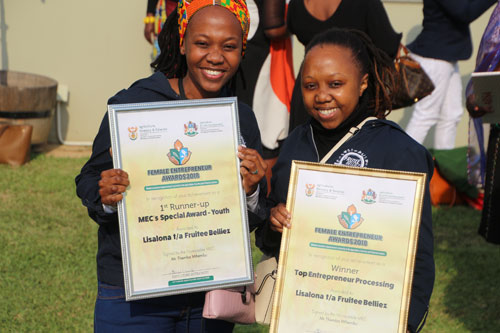
“We started off by selling fresh fruit salad, made of five different fruits, in 250ml cups in schools around uMlazi. The mission was to reduce learners’ unhealthy consumption of vetkoek,” said Mthethwa.
The sales were marginal, however, and it was only when the sisters joined eThekwini Municipality’s women empowerment programme that they were able to take their business to the next level – supplying fruit salad to caterers for weddings and funerals.
“We approached catering companies, gave them samples, and some placed orders instantly. Caterers also wanted prepared vegetables because they don’t have time to peel and chop and we decided to do that as well. At first it was difficult because everything was manual and if we had two orders on the same day, we had to sacrifice sleeping and do the job overnight,” she said.
Frutee Belliez has grown from a home enterprise to an established business with an industrial kitchen in Waterfall, five permanent employees and a steady flow of orders. The sisters have bought machines to peel vegetables and a big blender for smoothies.
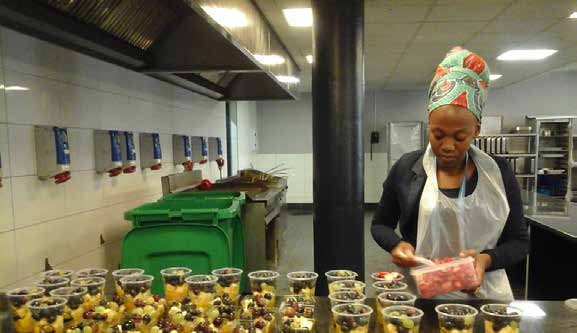 Frutee Belliez won the young agro-processor category of the KZN Department of Agriculture’s Female Farmer of the Year awards in 2010 as well as the provincial leg of the SAB Kickstart entrepreneurship programme in 2011. It also came second in the Daimler Fleet Management Business Plan competition in the same year and this year, won R125 000 in the KZN Department of Agriculture Female Awards: Best Entrepreneur Processor.
Frutee Belliez won the young agro-processor category of the KZN Department of Agriculture’s Female Farmer of the Year awards in 2010 as well as the provincial leg of the SAB Kickstart entrepreneurship programme in 2011. It also came second in the Daimler Fleet Management Business Plan competition in the same year and this year, won R125 000 in the KZN Department of Agriculture Female Awards: Best Entrepreneur Processor.
The sisters plan on opening a retail store in the future.
Ekurhuleni caters for the elderly
Ekurhuleni caters for the elderly JoySouth Africa provides a range of subsidised accommodation options for the elderly through local government.
 The City of Ekurhuleni has 25 service centres in which the elderly can find a home.
The City of Ekurhuleni has 25 service centres in which the elderly can find a home.
Vuk’uzenzele visited one of the centres to find out how it operates and to speak to one of the residents.
Baby Minnaar (87) arrived at Rest-a-while Service Centre for the aged about a year ago. The centre is in Primrose, Germiston.
She said what she loves most about staying there is that it is quiet and offers her privacy.
Minnaar added that most of her children were busy with their own lives and she personally loves to be alone.
“I am not lonely. I keep busy with house chores and other activities. I am still very active. I cook for myself also, unless I am sick,” she said.
Rest-a-while has 24 units and all residents are female. It has been operating for over 50 years.
Centre manager Trudy Carreira said the centre is different to a typical old-age home because residents look after themselves.
“We offer self-sufficient accommodation and thus do not have nurses and other professionals on the premises,” she explained.
Carreira said if residents can no longer take care of themselves their families will be contacted to make arrangements or they liaise with the Department of Social Development through the city so that the person can be transferred to an old-age home with health-care facilities.
The centre has a programme of activities to keep residents busy throughout the week, but they are not compulsory. Meals can be purchased for R20 each.
At most centres owned by the city, residents pay a minimal fee of R75.05 and standard monthly levies ranging from R233 to R389. Electricity consumption is billed separately.
For senior citizens to qualify as residents at these centres, they must be 60 years or older, South African citizens and residents of Ekurhuleni. Their monthly income (individual or joint) must be between R1 501 and R4 000.
Embrace your heritage
Embrace your heritage angenithaOn 24 September, Heritage Day, the nation will show its true colours, from vibrant Nwenda and Shweshwe fabric to bright imibhaco and xibelani dress.
 South Africa’s rich history and cultural diversity has been celebrated each September since 1996, when Heritage Month was introduced in an explosion of colourful traditional attire and lively indigenous dance.
South Africa’s rich history and cultural diversity has been celebrated each September since 1996, when Heritage Month was introduced in an explosion of colourful traditional attire and lively indigenous dance.
In order for society to be cohesive, it is important for its members to know who they are and learn about who others are as well.
The South African government uses every September as an opportunity to encourage citizens to learn about each other’s cultures and celebrate their differences. It aims to:
- Instil pride in the nation for its rich and diverse cultural heritage;
- Continue with a national process of uniting and reconciling all South Africans irrespective of race, creed, gender, sexual orientation or religion;
- Contribute to educating South Africans and the entire world on the richness and significance of celebrating the nation’s heritage;
- Create a platform in which South Africans can have debates on the nation’s heritage as far as its identification, documentation, protection, promotion and preservation is concerned;
- Promote national identity that is self-conscious of its liberation heritage; and
- Promote unity in diversity among all sectors of the South African society.
The transformation of the heritage landscape
This year’s Heritage Month is celebrated along with the centenary of the birth of the first democratically elected President, Nelson Rolihlahla Mandela, and will focus on the transformation of the South African heritage landscape.
Heritage is both tangible and intangible. Tangible heritage refers to buildings, historic places, artefacts and monuments, while our intangible heritage refers to attributes that we have inherited from the past generations, such as language and knowledge.
Some of the tangible things we can celebrate this Heritage Month:
- Freedom Park, Pretoria, opened in 2004;
- Nelson Mandela Museum in Mthatha, opened in 2002;
- Luthuli Museum, Groutville, KwaZulu-Natal, opened in 2004;
- Reburial of Sarah Bartmann in Hankey, Eastern Cape in 2002; and the
- Nelson Mandela Statue, Union Buildings, Gauteng, unveiled in 2013.
Essay competition tests innovative legal minds
Essay competition tests innovative legal minds tsoanaThe country’s legal society is looking for budding law enthusiasts to share their ideas through an essay.
Law students with a passion for law reform could win R20 000 in the South African Law Reform Commission (SALRC)’s Legal Essay writing competition.
Drawing on the inspirational legacy of Justice Pius Langa, the SALRC in partnership with sponsor Juta Law, is searching for young LLB and LLM students who have original and innovative ideas on issues pertaining to law reform in South Africa.
The competition encourages the critical legal writing of students, while generating new ideas for law reform. These ideas should be aligned to South Africa’s priorities as a developmental state, and is aimed at keeping the law abreast of developments in society while staying in tune with the needs of South Africa’s diverse population and national policy priorities.
The legal writing essay competition, which was originally named in honour of the first Chief Justice of the democratic era, Justice Ismail Mahomed, has been relaunched to honour a range of South African legal achievers.
From 2018, the competition will celebrate the contributions of legal luminaries. This year is dedicated to the late Chief Justice and Head of the Constitutional  Court, Pius Nkonzo Langa.
Court, Pius Nkonzo Langa.
How to enter
The competition is divided into two categories and is open to LLB and LLM students registered at a South African University or tertiary institution in any year of study. Abridged versions of completed Masters dissertations will also be accepted. PhD students are not eligible to enter.
Students must submit entries in English. The entries must be between 4 000 to 6 000 words long. Essays can be on any topic relating to the modernisation, improvement, development or reform of any aspect, area or branch of South African law.
Winners in the LLB and LLM categories win a R20 000 cash prize each.
All entries must be submitted to the Assistant Secretary, South African Law Reform Commission, Private Bag X668, Pretoria, 0001, or email: mmfunzana@justice.gov.za
The closing date is 31st January 2019.
Faust’s story told through opera
Faust’s story told through opera angenithaState Theatre audiences will have a wonderful opportunity to indulge in the richness, elegance and refinement of French Grand Opera.
This spring, opera lovers can look forward to a 35-piece orchestral extravaganza presented by the Pretoria Symphony Orchestra and the South African National State Theatre.
The five-act opera, Faust, composed by Charles Gounod around 1856, tells the story of a classic German legend based on the historical Johann Georg Faust, an aging and disillusioned scholar. The character was originally created by the famous German playwright, Johann Wolfgang von Goethe.
Mezzo-soprano Abongile Ntulini (28) is one of the soloist who will showcase her talent in Faust, in the role of Marthe.
Ntulini first sang with an orchestra in 2010 when she was a member of a local choir, Voices of the Nation, at the Old Mutual National Choir Festival.
“I loved every moment. Opera means everything to me. It is my sanctuary. It means fulfilling fantasies of beautiful costumes and fascinating stages and props. Opera is a beautiful art that is more than just the music,” she said.
Pretoria Symphony Orchestra manager Lizette Vosloo said the the audience can expect anww audio-visual spectacle which includes a line-up of dazzling operatic soloists and rich symphonic orchestral music background.
“It gives the audiences a unique opportunity to experience the opulence, elegance and refinement of French Grand Opera,” she added.
The audience will see Faust calling upon evil and dark forces to assist him in regaining his youth and finding love. The Pretoria Symphony Orchestra began in 2002 and has 55 permanent members.
Faust is the orchestra’s biggest venture to date and the production will give budding South African-born opera singers a chance to launch their careers.
Faust will be performed at the State Theatre from 23 September until 12 October.
IT boffin makes an impact on health
IT boffin makes an impact on health tsoanaAward-winning information technology specialist Xolani Phakathi has been quietly designing a range of innovative computer programmes that are helping the KwaZulu-Natal (KZN) Department of Health to save money, while significantly enhancing its ability to deliver services smoothly and efficiently to the people.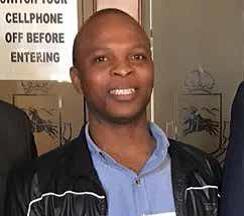
This includes a revolutionary web-based application that prevents patients from obtaining multiple devices such as wheelchairs, walking and hearing aids.
He also developed a computer programme that enables the department to consolidate and monitor procurement plans for health facilities – making it unnecessary for employees to drive to head office from all over the province to submit dense documents and data, which are impossible to email.
These computer programmes are now being showcased nationally by the Centre for Public Service Innovation (CPSI), with the possibility of being replicated in other government departments around the country.
The CPSI is a government component within the Ministry of Public Service and Administration.
Born in Inanda, Xolani (34) was recently nominated by the National Youth Development Agency as one of the country’s top young achievers; and was recognised by President Cyril Ramaphosa during this year’s National Youth Day Commemoration event.
He holds an IT Practitioner Diploma (Systems Support); an Advanced Diploma for IT Professionals (ICT Systems Support); a BTech degree (previously known as a Higher National Diploma) in Computer Science; and a Postgraduate Diploma in Strategic Business Information Technology.
Although he has been involved in the planning, conceptualisation and implementation of a number of IT-related innovative solutions for the department, he singles out the Assistive Devices Electronic Management System (ADEMS) as one of those that he is proudest of.
“Basically, the system regulates the issuing of assistive devices. It manages information on who has these devices, when they were issued, and who is still waiting to receive them. Our mandate as a department is to provide accessible services to our citizens by bringing about efficiency and effectiveness. I believe that this is what the ADEMS system does, as well as the many others that I have been involved in,” he said.
Phakathi believes that continuous self-improvement is key to staying relevant in the ever-changing field of IT.
Jobs: Department of Justice and Constitutional Development - Sep 2018
Jobs: Department of Justice and Constitutional Development - Sep 2018 angenithaAssistant State Attorney : Conveyancing, (LP3-LP4) (2 Posts) (Re-Advertisement)
Reference:18/61/SA
Salary: R283 854 – R805 179. (Salary will be in accordance with OSD determination). The successful candidate will be required to sign a performance agreement.
Requirements: An LLB or 4 year recognized legal qualification; Admission as an Attorney At least 2 years appropriate post qualification legal/litigation experience; Admission as a conveyancer and notary experience will be an added advantage; A valid driver’s licence.
Enquiries: Mr E Seerane (012) 315 1780
Note: Interested applicants may visit the following website: www.justice.gov.za or www.dpsa.gov.za to view the full job specification of the above positions. Applications must be submitted on Form Z83, obtainable from any Public Service Department or on the internet at www.gov.za. A Z83 form & CV must be accompanied by original certified copies of qualifications, identity document and a driver’s licence where necessary. A SAQA evaluation report must accompany foreign qualifications.
Applications that do not comply with the above mentioned requirements will not be considered. All shortlisted candidates for SMS posts will be subjected to a technical and competency assessment. Candidate will complete a financial disclosure form and also be required to undergo a security clearance. The foreigners or dual citizenship holder must provide the Police Clearance certificate from country of origin.
The DOJ&CD is an equal opportunity employer. In the filling of vacant posts the objectives of section 195 (1) (i) of the Constitution of South Africa, 1996 (Act No: 108 of 1996), the Employment Equity imperatives as defined by the Employment Equity Act, 1998 (Act No: 55 of 1998) and relevant Human Resources policies of the Department will be taken into consideration.
Reasonable accommodation shall be applied for People with Disabilities including where drivers licence is a requirement. Correspondence will be limited to short-listed candidates only. If you do not hear from us within 3 months of this advertisement, please accept that your application has been unsuccessful. The department reserves the right not to fill these positions. Women and people with disabilities are encouraged to apply and preference will be given to the EE Target.
Closing date: 17 September 2018
Court Manager (2 Posts)
Reference: 18/23C/KZN, Magistrate Office: Kokstad
Reference: 18/24C/KZN Magistrate Office: Nongoma
Salary: R444 693 – R523 818 per annum. The successful candidate will be required to sign a performance agreement.
Requirements: A 3 year qualification in Administration and/or a National Diploma in Service Management (NQF Level 5) plus module in Case Flow Management or equivalent qualification; At least 3 year’s managerial or supervisory experience; Knowledge and experience in office and district administration; Knowledge of the Public Financial Management Act (PFMA); Experience in managing Trust (Third Party Funds) and Vote Account; Experience in the Court environment will be an added advantage; A valid driver’s licence.
Enquiries: Mr J.N. Mdaka (031) 372 3000
Assistant State Attorney, (LP3-LP4)
Reference: 18/63/SA
Salary: R283 854 – R805 179. (Salary will be in accordance with OSD determination). The successful candidate will be required to sign a performance agreement.
Requirements: An LLB or 4 year recognized legal qualification; Admission as an Attorney; At least 2 years appropriate post legal/litigation experience; A valid driver’s licence.
Enquiries: Mr M G. Kooko (012) 315 1164
Registrar: MR-1
Reference: 18/25C/KZN
Salary: R186 828 –R867 399 per annum. (Salary will be in accordance with OSD determination). The successful candidate will be required to sign a performance agreement.
Requirements: LLB degree or four year recognised legal qualification; No previous legal experience required; A valid driver’s licence.
Enquiries: Mr J.N. Mdaka (031) 372 3000
Note: Interested applicants may visit the following website: www.justice.gov.za or www.dpsa.gov.za to view the full job specification of the above positions. Applications must be submitted on Form Z83, obtainable from any Public Service Department or on the internet at www.gov.za. A Z83 form & CV must be accompanied by original certified copies of qualifications, identity document and a driver’s licence where necessary. A SAQA evaluation report must accompany foreign qualifications. Applications that do not comply with the above mentioned requirements will not be considered. All shortlisted candidates for SMS posts will be subjected to a technical and competency assessment. Candidate will complete a financial disclosure form and also be required to undergo a security clearance. The foreigners or dual citizenship holder must provide the Police Clearance certificate from country of origin.The DOJ&CD is an equal opportunity employer. In the filling of vacant posts the objectives of section 195 (1) (i) of the Constitution of South Africa, 1996 (Act No: 108 of 1996), the Employment Equity imperatives as defined by the Employment Equity Act, 1998 (Act No: 55 of 1998) and relevant Human Resources policies of the Department will be taken into consideration.Reasonable accommodation shall be applied for People with Disabilities including where drivers licence is a requirement. Correspondence will be limited to short-listed candidates only. If you do not hear from us within 3 months of this advertisement, please accept that your application has been unsuccessful. The department reserves the right not to fill these positions. Women and people with disabilities are encouraged to apply and preference will be given to the EE Target.
Jobs: Department of Labour - Sep 2018
Jobs: Department of Labour - Sep 2018 angenithaPost: Deputy Director: Labour Centre Operations
Centre: Labour Centre: Queenstown
Reference No: HR 4/4/1/208
Salary: All inclusive: R 826 053 per annum
Enquiries: Adv. EM Yawa, Tel: (043) 701 3128
Provincial Office
Chief Director: Human Resources Operations:
Private Bag X 9005, East London, 5201
Post: Assistant Director: COID-Statutory: Services (2 posts)
Centre: Provincial Office: Western Cape
Reference No: HR4/4/10/197(1 post)
Provincial Office: Limpopo- Reference No: HR4/6/6/01(1 post)
Salary: Commencing: R 356 289 per annum
Enquiries: Ms. Z Maimane Tel (021) 4418125 or Ms. T Maluleke, Tel: (015) 290 1662
Provincial Office
Chief Director: Provincial Operation, PO Box, 872, Cape Town
Chief Director: Provincial Operations: Private Bag X 9368, Polokwane, 0700
Post: Deputy Director: Risk Management, Fraud and Anticorruption
Centre: Provincial Office: Western Cape
Reference No: HR 4/10/101
Salary: All inclusive: R 697 011 per annum
Enquiries: Ms. Z Maimane (021) 441 8125
Provincial Office
Chief Director: Provincial Operation, PO Box, 872, Cape Town, 8000
Post: Counsellor (2 posts)
Centre: Labour Centre: Fort Beaufort – Ref No: HR 4/4/1/179( 1 post)
Labour Centre: Oudtshoorn – Ref No: HR 4/4/10/104 (1 post)
Salary: Commencing: R 547 917.00 (OSD)
Enquiries: Ms. N Tetyana, Tel: (046) 645 4686 or Ms. Z Maimane (021) 441 8125
Provincial Office
Chief Director: Human Resources Operations: Private Bag X 9005, East London, 5201
Chief Director: Provincial Operation, PO Box, 872, Cape Town, 8000
Post: Assistant Director: Statutory Services
Centre: Provincial Office: Gauteng
Reference No: HR 4/4/4/08/08
Salary: Commencing: R 356 289 per annum
Enquiries: Adv M Msiza, Tel: (012) 309 4027
Post: Assistant Director: Supply and Demand (Performance Information Management)
Centre: Provincial Office: Gauteng
Reference No: HR4/4//4/08/06
Salary: Commencing: R 444 693 per annum
Enquiries: Mr. D Kgwele, Tel: (011) 853 0300
Post: Assistant Director: IT Administration and Office Services
Centre: Provincial Office: Braamfontein
Reference No: HR 4/4/4/07/08
Salary: Commencing: R 356 289 per annum
Enquiries: Mr. NS Mthethwa, Tel: (011) 853 0300
Post: Principal Inspector: Employment Equity
Centre: Provincial Office: Gauteng
Reference No: HR 4/4/4/04/24
Salary: Commencing: R 444 693 per annum
Enquiries: Adv M Msiza, Tel: (012) 309 5253
Provincial Office
Chief Director: Provincial Operations: PO Box 4560, Johannesburg, 2001
Post: Principal COID: Employers Auditor (2 posts)
Centre: Provincial Office: Mpumalanga
Reference No: HR 4/4/7/62
Centre: Provincial Office: KwaZulu Natal
Reference No: HR 4/4/5/68
Salary: Commencing: R444 693 per annum
Enquiries: Ms NL Njwambe (013) 655 8775 or Mr EM Khambula Tel: (031) 366 2203
Provincial Office
Chief Director: Provincial Operations, Private Bag x 7263, Witbank, 1035
Chief Director: Provincial Operations: PO Box 940, Durban, 4000
Closing date for applications: 01 October 2018 at 16:00
For full details of the advertised posts visit our website: www.labour.gov.za
Applications must be submitted on form Z83, obtainable from any Public Service Department or on the internet at www.gov.za/documents. The fully completed and signed form Z83 should be accompanied by a recently updated, comprehensive CV as well as recently certified copies of all qualification(s) including a Senior Certificate and ID-document [Driver’s license where applicable]. Non-RSA Citizens/Permanent Resident Permit Holders must attach a copy of their Permanent Residence Permits to their applications. Should you be in possession of a foreign qualification, it must be accompanied by an evaluation certificate from the South African Qualification Authority (SAQA). Applicants who do not comply with the above-mentioned requirements, as well as applications received late, will not be considered. The Department does not accept applications via fax or email. Failure to submit all the requested documents will result in the application not being considered. Correspondence will be limited to short-listed candidates only. If you have not been contacted within eight (8) weeks after the closing date of this advertisement, please accept that your application was unsuccessful. Suitable candidates will be subjected to a personnel suitability check (criminal record, citizenship, credit record checks, qualification verification and employment verification). Where applicable, candidates will be subjected to a skills/knowledge test. All shortlisted candidates for SMS posts will be subjected to a technical competency exercise that intends to test relevant technical elements of the job, the logistics of which be communicated by the Department. Following the interview and technical exercise, the selection panel will recommend candidates to attend generic managerial competencies using the mandated DPSA SMS competency assessment tools. Successful candidates will be appointed on a probation period of 12 months. The Department reserves the right not to make any appointment(s) to the above post. The successful candidate will be expected to sign a performance agreement. The Department of Labour is an equal opportunity affirmative action employer. The employment decision shall be informed by the Employment Equity Plan of the Department. It is the Department’s intention to promote equity (race, gender and disability) through the filling of this post(s) with a candidate whose transfer / promotion / appointment will promote representativity in line with the numerical targets as contained in our Employment Equity Plan.
Jobs: Department of Public Enterprises - Sep
Jobs: Department of Public Enterprises - Sep angenithaManagement Echelon: DDG: Corporate Management
(Ref No: DPE/2018/072)
Unit: Corporate Management (This is a re-advertisement, applicants who previously applied must reapply)
Salary: R1 446 378 per annum (all-inclusive flexible remuneration package consisting of basic salary of 70% and a 30% flexible portion that can be structured according to individual needs)
Centre: Pretoria
Requirements: Applicant must be in possession of a postgraduate degree in Business Administration (NQF Level 8) as recognized by SAQA accompanied by 8-10 years’ experience at a senior managerial level. The successful candidate must be a dynamic and confident person. Knowledge and understanding of Public Service Regulatory Framework, strong leadership and management capability. Stakeholder management. Strategic thinking, problem solving skills, strong analytical skills and communication skills and Financial Management skills.
Duties: Direct and manage the provisioning of effective, efficient and communication management services Direct and manage the establishment and maintenance of appropriate systems (analytical tools, information systems and models or projections of cost behavior) and policies to ensure effective and efficient management of financial resources and assets within DPE. Manage the provisioning of technically support services to the Head of Department and other senior managers in the execution of their functions in terms of the Public Finance Management Act, 1999, the Treasury Regulations, Treasury Practice Notes and King IV Report. Manage processes for the formulation of creative solutions to enhance cost effectiveness and efficiency in the delivery of the services and the administration of the Department. Direct and manage the provisioning of-human resource system development and planning services. Recruitment, selection and career management services. Employee benefit administration services. Employee relations services. Staff development services. Employee support services. Coordinate departmental mandate processes in the HRM space. Exercise delegated powers in terms of the provisions of the Public Service Act, 1994 and Public Service Regulations. Coordinate and facilitate processes to establish the HRM function as a strategic partner and ensure that appropriate service delivery standards are established; and internal procedures and processes are on a continuous basis reviewed and aligned to add value to the operations of the Department without compromising internal control arrangements. Direct and manage the provisioning of office and security management services. Manage a professional team of experts with a view to oversee and direct the provisioning of internal and external communication and media services. Provisioning of marketing and public relations services. Publication, webpage, intranet and graphic services; and customer care services. Represent the strategic intent (including funding) of the communication and marketing functions within the executive governance structures of the Department. Promote at executive management level the utilisation of IT as a strategic business process enabler. Oversee the development, maintenance and implementation of the DDPE Master Systems Plan. Represent the strategic intent (including funding) of the IT and ICT functions within the executive governance structures of the Department. Oversee the development, maintenance and delivery on the Work Plan of the DGITO function Identify and manage the financial, human and equipment resources of the Programme required to optimally support the implementation of the Unit’s Annual Performance Plan. Represent the strategic intent of the Programme as part of internal resource allocation processes. Manage and account for the utilisation of the financial resources of the Programme in line with the departmental delegations. Monitor, evaluate and account for the effective and efficient utilisation (value for money) of allocated resources. Direct, manage and account for the utilisation of the Unit’s human resources. Based on operational imperatives re-prioritise the allocation of resources within the Unit. Oversee strategic and annual planning processes for the Unit and ensure compliance with the DPE’s Strategic Planning and Performance Review basis reviewed and aligned to add value to the operations of the Department without compromising internal control arrangements. Direct and manage the provisioning of office and security management services. Manage a professional team of experts with a view to oversee and direct the provisioning of internal and external communication and media services. Provisioning of marketing and public relations services. Publication, webpage, intranet and graphic services; and customer care services. Represent the strategic intent (including funding) of the communication and marketing functions within the executive governance structures of the Department. Promote at executive management level the utilisation of IT as a strategic business process enabler. Oversee the development, maintenance and implementation of the DDPE Master Systems Plan. Represent the strategic intent (including funding) of the IT and ICT functions within the executive governance structures of the Department. Oversee the development, maintenance and delivery on the Work Plan of the DGITO function Identify and manage the financial, human and equipment resources of the Programme required to optimally support the implementation of the Unit’s Annual Performance Plan. Represent the strategic intent of the Programme as part of internal resource allocation processes. Manage and account for the utilisation of the financial resources of the Programme in line with the departmental delegations. Monitor, evaluate and account for the effective and efficient utilisation (value for money) of allocated resources. Direct, manage and account for the utilisation of the Unit’s human resources. Based on operational imperatives re-prioritise the allocation of resources within the Unit. Oversee strategic and annual planning processes for the Unit and ensure compliance with the DPE’s Strategic Planning and Performance Review Agenda. Direct the utilisation of technology in support of the Unit’s business processes.
Deputy Director – General: SOC Governance Assurance and Performance
(Ref No: DPE/ 2018/073)
Unit: Governance Assurance and Performance
Salary: R1 446 378 per annum (all-inclusive flexible remuneration package consisting of basic salary of 70% and a 30% flexible portion that can be structured according to individual needs)
Centre: Pretoria
Requirements: A relevant post graduate qualification at NQF level 9 in Legal and/or Business Administration and/or Accounting. At least 8-10 years’ senior management experience of which 5 years’ must be at SMS level in the public service. The successful candidate must be a dynamic and confident person. Knowledge and understanding of Public Service Regulatory Framework, strong leadership and management capability. Stakeholder management. Strategic thinking, problem solving skills, strong analytical skills and communication skills and Financial Management skills.
Duties: Strategically direct and account for the provisioning of specialist SOC governance assurance services and report thereon. At a strategic level, direct and oversee the development and implementation of the DPE’s SOC governance policy and instruments frameworks inclusive of governance standards; governance assessment toolkits for the SOC Group; and the SOC Groups governance reporting framework. At a strategic level, manage the provisioning governance early warning services to the Stakeholder. Manage SOC governance review processes and at a technical level engage executive management of SOC’s on identified governance issues. Provide, through the Director- General, at a strategic level technical advisory services to the Minister as Shareholder on governance issues within a specific SOC. Provide, through the Director-General, technical advisory services to the Minister with regard to the appointment and management of SOC Boards. Strategically direct and account for the provisioning of specialist financial sustainability assurance services and report thereon. At a strategic level, direct and oversee the development and implementation of standardised financial monitoring, evaluation and reporting instruments for the DPE’s SOC Group. Manage at a strategic level due diligence processes for the assessment of funding instruments for SOCs in the Group and liaise with Treasury on the technical aspects of such instruments and state guarantees. Manage SOC governance review processes and at a technical level engage executive management of SOC’s on identified financial sustainability and instrument issues. Provide, through the Director-General, at a strategic level technical advisory services to the Minister as Shareholder on financial sustainability issues within a specific SOC. Coordinate at a strategic level processes to analyse financial performance data of SOCs inclusive of developing sustainability models to inform aligned compact requirements. Coordinate at a strategic level processes to report to the Shareholder on the financial status of the SOCs in the Group. Strategically direct and account for the provisioning of specialist SOC operational risk profiling and mitigating services. Strategically direct the development of institutional capacity for the performance of a SOC Group risk management function, including policies and instruments. Strategically direct the development, maintenance and implementation of the DPE’s SOC Group’s Risk Register and mitigation strategies. Coordinate at a strategic level processes to analyse the impact of risk mitigation strategies and report thereon to inter alia also inform compact alignment requirements. Coordinate at a strategic level processes to provide the Shareholder with early warning services. Manage SOC risk assessment review processes and at a technical level engage executive management of SOC’s on identified risk issues and mitigation strategies. Manage the allocated resources of the Branch in line with legislative and departmental policy directives and comply with corporate governance and planning imperatives. Identify and manage the financial, human and oversee the development and implementation of standardised financial monitoring, evaluation and reporting instruments for the DPE’s SOC Group. Manage at a strategic level due diligence processes for the assessment of funding instruments for SOCs in the Group and liaise with Treasury on the technical aspects of such instruments and state guarantees. Manage SOC governance review processes and at a technical level engage executive management of SOC’s on identified financial sustainability and instrument issues. Provide, through the Director-General, at a strategic level technical advisory services to the Minister as Shareholder on financial sustainability issues within a specific SOC. Coordinate at a strategic level processes to analyse financial performance data of SOCs inclusive of developing sustainability models to inform aligned compact requirements. Coordinate at a strategic level processes to report to the Shareholder on the financial status of the SOCs in the Group. Strategically direct and account for the provisioning of specialist SOC operational risk profiling and mitigating services. Strategically direct the development of institutional capacity for the performance of a SOC Group risk management function, including policies and instruments. Strategically direct the development, maintenance and implementation of the DPE’s SOC Group’s Risk Register and mitigation strategies. Coordinate at a strategic level processes to analyse the impact of risk mitigation strategies and report thereon to inter alia also inform compact alignment requirements. Coordinate at a strategic level processes to provide the Shareholder with early warning services. Manage SOC risk assessment review processes and at a technical level engage executive management of SOC’s on identified risk issues and mitigation strategies. Manage the allocated resources of the Branch in line with legislative and departmental policy directives and comply with corporate governance and planning imperatives. Identify and manage the financial, human and equipment resources of the Programme required to optimally support the implementation of the Branch’s Annual Performance Plan. Represent the strategic intent of the Programme as part of internal resource allocation processes. Manage and account for the utilisation of the financial resources of the Programme in line with the departmental delegations. Monitor, evaluate and account for the effective and efficient utilisation (value for money) of allocated resources. Mobilise technical support of the business support components to implement and maintain prescribed human resource, financial and supply chain management systems within the Branch. Direct, manage and account for the utilisation of the Branch’s human resources. Based on operational imperatives re-prioritise the allocation of resources within the Branch. Oversee strategic and annual planning processes for the Branch and ensure compliance with the DPE’s Strategic Planning and Performance Review Agenda. Strategically direct the utilisation of technology in support of the Branch’s business processes. Develop and maintain strategic partnerships in support of Branch’s operations.
Enquiries: Ms Henriette Strauss Tel: 012 431 1022
The post of Deputy Director-General: Corporate Management (Ref DPE/2018/ 072) is re-advertised, applicants who applied previously must reapply.
Applications: The Department of Public Enterprises, Private Bag X15, Pretoria, 0028 or hand deliver at: 1090 Infotech Building, Arcadia &Hilda Street, Hatfield 0028 or 642 Cnr Olivia street and Jacqueline Drive, Garsfontein Pretoria, Postal Address: P.O BOX 394, Menlyn, 0063or by email: dpe1@basadzi.co.za, Enquiries: (012) 998 8953
Closing Date: 14 September 2018
Note: Applications must be submitted on form Z83 and should be accompanied by certified copies of qualifications, ID as well as a comprehensive CV in order to be considered. It is the applicant’s responsibility to have foreign qualifications evaluated by the South African Qualification Authority (SAQA). Correspondence will be limited to successful candidates only. If you have not been contacted within 3 months after the closing date of this advertisement, please accept that your application was unsuccessful. Shortlisted candidates will be subjected to screening and security vetting to determine the suitability of a person for employment. Failure to submit the requested documents will result in your application not being considered.
Jobs: Environmental Affairs Sep 2018
Jobs: Environmental Affairs Sep 2018 angenithaChief Director: Integrated Coastal Management and Coastal Conservation
Salary: Remuneration package of R1 189 338 per annum (all-inclusive salary package)
Centre: Cape Town
Ref: OC 42/2018
Requirements: An appropriate recognised Bachelor’s degree in Natural Sciences or equivalent qualification (NQF Level 7). A minimum of 5 years experience at senior managerial level. Knowledge of Oceans and Integrated Coastal management legislative frameworks. Skill and insight in the implementation of environmental management interventions. Capacity in environmental management policy development and policy development processes. Good communication skills (verbal and written) with experience in stakeholder engagement. Proven strategic management and leadership skills. Experience in financial management and related legislation within the public sector.
Duties: The successful candidate will be responsible for providing leadership in the management and co-ordination of programmes to address coastal ecosystem health by developing strategies and plans for the management of oceans and coastal management. Manage coastal biodiversity protection and expansion of the conservation estate. Manage and coordinate initiatives to address coastal vulnerability and improve public access. Manage and coordinate the development of regulatory frameworks. Provide strategic leadership and good corporate governance and enhance international interest.
Enquiries: Ms J. Beaumont, tel. (021) 819 2410.
Closing date: 1 October 2018
Mahlangu showcases Ndebele heritage to the world
Mahlangu showcases Ndebele heritage to the world vuyelwanDespite having no formal education, iconic Ndebele artist Esther Mahlangu has gained international fame, thanks to the passion she has for her heritage.
Dr Esther Mahlangu (82) is the perfect embodiment of what can be achieved by embracing your heritage.
Mahlangu is known all over the world as the South African artist from the Ndebele nation who uses her contemporary painting style to represent amaNdebele.
Her work has been featured by various local and international brands such as BMW, Honda, British Airways, Albany and Tastic rice, to mention a few. It has also been showcased in many art exhibitions across the globe.
Vuk’uzenzele visited her home near Mthambothini in Mpumalanga to speak to her about the importance of embracing heritage and culture.
“My heritage is part of who I am. It is important for everyone to love who they are and respect their culture. Respecting your culture can take you places and also put food on your table,” she said.
Youth and heritage
Mahlangu said young people should take it from her that sticking to their roots and embracing their traditions and culture could be their ticket to the world.
She has proudly embraced her Ndebele culture throughout her life, in how she dresses, her hairstyle and, most importantly, how she has decorated the interior and exterior of her home with iconic Ndebele shapes and colours.
The geometric patterns painted on houses announce events like a birth, death, wedding, or when a boy goes off to the initiation school. “Even when a woman gets married, she is expected to paint her own house by herself to show her in-laws that she has been brought up well,” Mahlangu added.
Mahlangu was taught to paint by her mother and grandmother and first tackled her own patch of wall when she was 10 years old. She loved painting but had no idea that one day she would make a living out of it and even travel the world.
“I grew up seeing my mother and grandmother do the paintings at home,” she said. One day, when they took a break, little Esther snuck in and did a bit of painting of her own. She was caught and scolded but the allure was too great and she continued to sneakily add her own daubs of colour. Eventually, her grandmother allowed her to claim a spot behind the house as her own.
“They later realised that I had a passion for it and I had improved, so they finally allowed me to paint the front of the house where everyone could see. They were impressed with what I could do,” she recalled.
Back then, Mahlangu said they mixed cow dung with white soil, red soil or black soil in order to get the colours they wanted. Chicken feathers were used as brushes.
“When I got married, I was already mastering the art of painting, and my in-laws were really impressed. They could see that I was raised well,” she said.
Mahlanguís first international trip
Years later – in the late 1980s, her colourful Middelburg home drew the attention of French tourists who were so blown away by her work that they commissioned her to do work in France.
“They took a picture of my house. It was a long time ago. Nelson Mandela was still in prison then. The tourists went to look for me immediately and when they found me, they told me that they wanted me to go to France with them to do the painting in their country,” she recalled.
“I had to get permission from my children and started making arrangements to get a visa. About five months later, my documents were ready and they came to fetch me. It was my first flight and so I arranged to travel with one of my children. When I arrived in Paris, I was shocked to see that they had built a house exactly like mine and they just wanted me to decorate it like I had done my own in South Africa,” she shared.
She has since been in demand and toured many countries across the globe to showcase her talent and the rich Ndebele heritage. Her work has taken her to Japan, Portugal, Italy, Spain, the United States of America, Germany, Switzerland, Australia, Brazil and England.
World-wide recognition
She has collected a number of accolades over the years, internationally and locally, including an honorary doctorate and an Order of Ikhamanga along with being the first woman in the world to create artwork on the BMW 5251.
“All these awards and recognition for my work mean a lot to me as an individual and a Ndebele woman. I am really happy and it encourages me to continue inspiring others to love their culture,” she said.
“All my life, I have maintained the same hairstyle and worn my traditional regalia. This is who I am and I am proud of it. I wish young people could go back to their roots and embrace who they are so that the world can recognise them for who they are,” she said.
Mahlangu had three children but they have all passed on. However, she has passed on her knowledge to her grandchildren and has also opened the Ndebele Art School for children in her area.
“Some of my students have already travelled overseas to showcase their talents,” she said.
While Mahlangu’s work has evolved over the years, and she paints on various mediums, including canvas and ceramic, she continues to paint freehand without prior measurement or sketches and to use feathers and bundles of twigs as brushes.
Mpumalanga boasts with its first World Heritage Site
Mpumalanga boasts with its first World Heritage Site tsoanaTourism Month
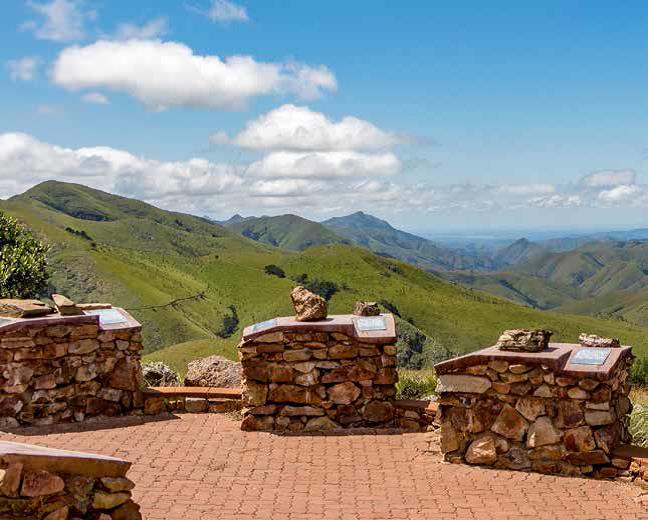 South Africa beautiful rolling hills and scenic coastline come together to create magnificent World Heritage Sites.
South Africa beautiful rolling hills and scenic coastline come together to create magnificent World Heritage Sites.
The Barberton-Makhonjwa Mountains, in Mpumalanga, were officially declared as South Africa’s 10th World Heritage Site by the United Nations Educational‚ Scientific and Cultural Organisation (Unesco).
The site comprises 40 percent of the Barberton Greenstone Belt, one of the world’s oldest geological structures, and represents the best-preserved succession of volcanic and sedimentary rock dating back 3.6 to 3.25 billion years, when the first continents were starting to form on primitive Earth.
The mountain lands are also believed to contain the oldest signs of life‚ with a micro fossil of bacteria discovered there that is estimated to be 3.1 billion years old.
Minister of Arts and Culture Nathi Mthethwa, said in a statement that World Heritage Sites are recognised as having global historical or environmental significance.
“To be accepted onto the list‚ a country must meet stringent criteria and show how the site will be conserved. The recognition allows the country to access funds for conservation from the World Heritage Fund and may increase tourism to the area,” said Mthethwa.
Mthethwa added that it is hoped that Mpumalanga’s first World Heritage Site will provide a global marketing boost for tourism that can reach beyond that of its established national parks.
Barberton-Makhonjawa Geotrail
The site also has a the Barberton-Makhonjawa Geotrail developed to preserve Barberton’s geological heritage, by building awareness and interest among local stakeholders, as well as local and international tourists.
The geotrail consists of striking and informative roadside panels that have been installed along the 40 km tarred road between Barberton and the Swaziland border post at Josefsdal Bulembu.
The geotrail provides visitors of all ages with an enjoyable and educational outdoor experience, guaranteed to provide new and fascinating insights into how life on Earth began.
The site also incorporates one of Mpumalanga’s hidden gems, the Songimvelo Nature Reserve, one of South Africa’s largest provincial reserves situated among magnificent rolling hills and steep mountains with the Komati River winding through it.
South Africans should also take pride in living in a country that is home to other World Heritage sites, which are:
Fossil Hominid Sites of South Africa - Known in South Africa as the Cradle of Humankind, the region of Sterkfontein, Swartkrans, Kromdraai and environs has one of the world's richest concentrations of hominid fossils, evidence of human evolution over the last 3.5-million years. These fossil sites are found in the provinces of Gauteng Limpopo and North West.
iSimangaliso Wetland Park- iSimangaliso Wetland Park is a protected area along the KwaZulu-Natal coast. The park boasts the scenic Lake St. Lucia which is home to hippos, crocodiles, pelicans and flamingos.
Robben Island- The Island was declared a World Heritage Site for bearing buildings that are a testimony to history, and at the same time symbolise the triumph of the human spirit, of freedom, and of democracy over oppression.
Maluti-Drakensberg Park * - This has the famous Amphitheatre in the Royal Natal National Park and the southern Drakensberg. This park is home to black eagle, bearded vulture and herds of eland as well as many other indigenous plants and animals.
Mapungubwe Cultural Landscape- This was South Africa's first kingdom, and developed into the subcontinent's largest realm, lasting for 400 years before it was abandoned in the 14th century. It is situated in the Mapungubwe National Park in Limpopo.
Cape Floral Region Protected Areas - The Cape Floral Region takes up only 0.04 percent of the world's land area, yet contains three percent of its plant species. This makes it one of the richest areas for plants in the world and one of the globe's 18 biodiversity hot spots.
Vredefort Dome - The area displays exceptional beauty and is rich in biodiversity with animal and plant populations. The Vredefort Dome has exceptional tourism potential, is situated about 100 km from Johannesburg.
Richtersveld Cultural and Botanical Landscape - The Richtersveld Cultural and Botanical Landscape is located in South Africa’s northern Namaqualand. The area comprises 160 000 hectares of desert scenery, which vary from flat sandy plains, to craggy sharp mountains of volcanic rock, to the lush flood plains of the Orange River. This river forms the border between South Africa and neighbouring Namibia
Khomani Cultural Landscape - The area in the Southern Kalahari, bordered in the east by Botswana and the west by Namibia, is where you will find a small group of the Khomani San, who were the first people who inhabited the Kalahari.
NSFAS 2019 applications open
NSFAS 2019 applications open tsoanaNSFAS 2019 applications open
The Minister of Higher Education, Naledi Pandor, says it is all systems go for next year’s applications for funding.
Are you a matriculant who might need financial assistance in your first year of higher education learning?
Higher Education and Training Minister Naledi Pandor has announced that the 2019 National Student Financial Aid Scheme (NSFAS) applications for new applicants opened on 3 September 2018.
New applicants are urged to apply on the improved online application system known as MyNSFAS Online. The new system aims to improve the time that users take to apply for funding.
After the completion and submission of their applications, learners will receive SMS notifications confirming that the applications were captured successfully.
Once a student has applied to NSFAS there is a waiting period of about week. Should a student not receive any acknowledgement, they
are requested to call NSFAS’s TOLL FREE Call centre on: 08000 NSFAS (67327).
Meanwhile, NSFAS has announced progress made in resolving the of disbursing outstanding funds that are due to students. It said in a statement that the following steps had been taken:
■ NSFAS has deployed staff to all institutions to facilitate the process of addressing the bottlenecks that have resulted from a range of factors.
■ The necessary funds are available and steady progress is being made in providing support to qualifying students.
■ NSFAS has welcomed the support from institutions and student representative councils at universities and TVET colleges in clearing bottlenecks to the disbursement of funds.
■ The support of the in stitutions and SRCs has been to assist NSFAS to ensure that students have completed and signed the necessary agreements.
Students are urged to sign outstanding NSFAS Bursary Agreements to ensure that their 2019 applications proceed smoothly.
Minister Pandor also called on all students to make sure they inform NSFAS of their change of contact details, particularly cell phone numbers, as this is the primary communication tool to inform students of the disbursement of funds.
For more information log on to https://my.nsfas.org.za/mynsfas/selfservice.html
NSFAS lends a helping hand
NSFAS lends a helping hand JoyStudents with the will to succeed despite their disabilities have been given a helping hand.
 A car accident when he was a child left Gift Masuku’s left arm paralysed. Despite this, the 23-year-old from Sekhukhune in Mpumalanga is a successful third-year BSc student at the University of Venda.
A car accident when he was a child left Gift Masuku’s left arm paralysed. Despite this, the 23-year-old from Sekhukhune in Mpumalanga is a successful third-year BSc student at the University of Venda.
“The disability has always affected my studies. For instance, when I do my practical assignments, I need help handling the equipment that we use,” he said.
His studies also require him to type assignments and do research. This means that he needs to make use of a computer or laptop.
“I tend to work slowly when I am in a computer lab because I use one hand to type,” he said, explaining that this often meant he fell behind in his work.
Life became considerably easier for Masuku when he received a laptop of his own. He was among the 74 students living with disabilities who received assistive devices from the National Student Financial Aid Scheme (NSFAS) and the University of Venda.
NSFAS said this was the first assistive devices handover. It was an initiative of the NSFAS Disability Bursary Programme.
The programme provides financial support to students with disabilities who need financial aid and possess the ability to pass their academic subjects.
The scheme has funded 2 915 students living with disability across all 26 universities and 50 TVET colleges in South Africa.
According to NSFAS, the University of Venda is one of the institutions that has the highest number of students living with disability.
The university’s Disabled Students Unit has 192 students with various disabilities who registered for academic support.
During the 2018 academic year, the unit worked closely with NSFAS to purchase devices for 74 of the registered students.
NSFAS has urged students living with disability who wish to further their studies to apply to the NSFAS Disability Bursary Programme during the 2019 application cycle. More information can be accessed on: www.nsfas.org.za
New Booysens court uplifts community
New Booysens court uplifts community tsoanaThe construction of the new facility has created jobs and long-lasting skills for locals.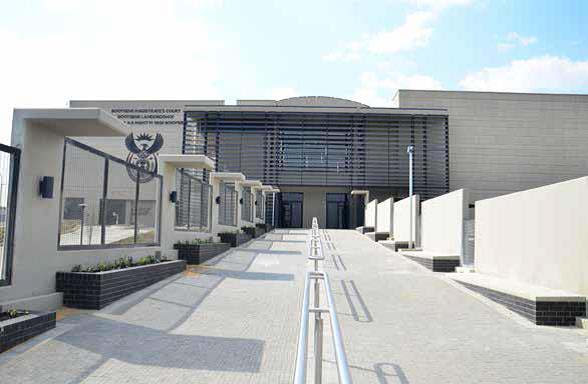
Noma Meslane went from being a housewife and volunteer HIV/AIDS counsellor to educating construction workers about workplace safety when she started working on the site of the new Booysens Magistrate’s Court.
Meslane is just one local woman who has benefitted from the construction of the court located south of Johannesburg.
The project is being implemented by the Independent Development Trust (IDT) on behalf of the Department of Justice and Constitution Development at a cost of over R240-million as part of a contract awarded to the IDT to plan, design and construct new courts around South Africa.
The IDT has contributed to the creation of at least 1 665 job opportunities during the project.
When construction on the site began in June 2016, the IDT and the community around the construction site, had reached an agreement that 50 percent of the labour employed would be local.
Candidates without the necessary skills were trained and received certificates that would help them find suitable jobs in future.
Meslane who is 43, is one such candidate, She lives in the nearby suburb of Linmeyer, with her husband and three children. She had previously worked as a volunteer HIV/AIDS counsellor, and received her certificate in HIV counselling at a local clinic.
This experience has held her in good stead as a safety representative on site, where she was trained to identify hazards, extinguish fires and administer first aid.
“I carry out induction before anyone goes on site. It is my job to ensure that people are aware of the hazards they will come across on a construction site and prepare them so they do not get injured,” she said.
Meslane received a Safety Representative Certificate after the training, which she said would help her find employment on other construction sites once work on the court complete.
The Booysens Magistrate’s Court is almost complete and comprises ten courtrooms, a civil court; two family courts and one child, domestic violence; and Peace Order Court. There are also administration offices, 15 magistrates’ offices, and holding cells with provision for juvenile and adult male and female cells respectively.
Registering customary marriages protects families
Registering customary marriages protects families vuyelwanIn South Africa, customary marriages are an accepted part of cultures and heritage. However, it is important to note that these marriages need to be carried out fairly and legally, so that the rights of both the husband and wife are protected.
Commission for Gender Equality’s legal director Marissa van Niekerk, explains customary marriages and the important factors that people need to keep in mind.
Vuk: What are customary marriages?
MvN: Customary marriages are concluded in accordance with the customs and usages traditionally observed among South Africans.
Vuk: What laws should these marriages comply with?
MvN: Customary marriages are regulated by the Recognition of Customary Marriages Act 120 of 1998. The following requirements have to be met:
- Both parties must consent to be married to each other.
- The spouses must both be above the age of 18, unless the parents or legal guardians provide consent when one or both parties are minors.
- The marriage must be registered at the Department of Home Affairs within three months in order to protect the interests of the spouses, children and family members in the event of divorce or death.
- When registering the marriage, the spouses must present copies of their identity documents and a lobola agreement (if available). At least one witness from each family must also be present.
- A husband who wants to enter into a second customary marriage with another woman must apply to the court.
- People who are part of civil marriages cannot enter into a customary marriage.
The Recognition of Customary Marriages Act states that both parties in the marriage have equal rights as husband and wife.
Vuk: What are the potential problems posed by customary marriages?
MvN: Non-registration poses significant problems. Registration provides proof that the marriage exists, so proving that an unregistered marriage exists is difficult. This will impact the court’s ability to protect the rights of spouses in a divorce, inheritance of a deceased’s estate and the rights of children and family members.
Another potential issue is that parties to a customary marriage often confuse divorce and separation. It is important to highlight that only a court with proper jurisdiction can grant a divorce. Married couples who separate informally will not benefit from the legal rules regulating the ending of a marriage.
If you need information about this matter call the Commission for Gender Equality on 0800 007 709.
SA and UK strengthen ties
SA and UK strengthen ties angenithaSouth Africa and the United Kingdom have identified key sectors for investment aimed at boosting economic growth and development.
This was after President Cyril Ramaphosa recently hosted UK Prime Minister Theresa May at Tuynhuys in Cape Town. 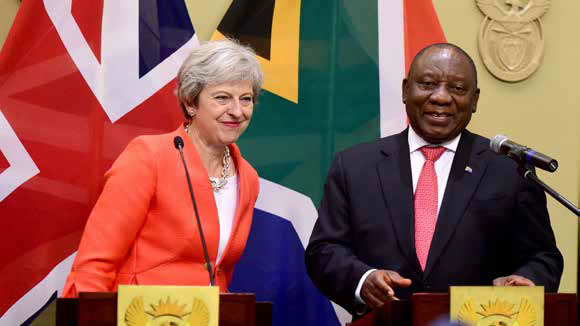
Prime Minister May was in South Africa on a working visit.
The Prime Minister’s visit to South Africa and other African countries was seen as a push to cement ties with countries outside the European Union as Britain prepares to leave Europe’s trade bloc by March next year.
President Ramaphosa said during the talks between the two countries, the parties reviewed a range of issues of a bilateral, continental and global nature.
“In our official talks, we noted the increased economic cooperation and trade relations between our countries. Both our countries have identified key sectors for investment to boost economic growth and development.
“These sectors include manufacturing, agro-processing, infrastructure development, mining, energy and tourism.
The UK was South Africa’s sixth largest global trading partner in 2017, with total trade at R79.5 billion.
The UK also remains the key source of long-haul tourism to South Africa, with nearly
448 000 visitors in 2017.
Prime Minister May said the UK’s aim was to be the number one G7 investor in Africa by the year 2022.
She said the UK was in full support of South Africa’s drive to attract investment of US$100 billion to create jobs and bolster growth.
“I want to see British companies play a central role in helping [South Africa] achieve your ambitions, helping to create and sustain high quality jobs for the people from both our countries,” she said.
SAnews.gov.za
This month in history
This month in history angenithaSaturday, 26 September 1936 Winnie Madikizela-Mandela is born
Nomzamo Winifred Zanyiwe Madikizela, apartheid activist and former wife of President Nelson Mandela, was born the fifth of nine children in the village of Mbongweni in Bizana, Pondoland on 26 September 1936.
In 1953, Winnie was admitted to the Jan Hofmeyr School of Social Work in Johannesburg. She completed her degree in social work in 1955, finishing at the top of her class. She was offered the position of medical social worker at the Baragwanath Hospital in Johannesburg, making her the first qualified Black member of staff to fill that post. While working at the hospital, Winnie’s interest in national politics continued to grow. She met President Mandela in 1957 and they married in Bizana on 14 June 1958.
Madikizela-Mandela was a staunch opponent of P W Botha's government and apartheid, which saw her being served several banning orders, imprisonment and banishment. Her efforts to keep the resistance alive earned her the title of "Mother of the Nation."
Winnie passed away after a long illness in Johannesburg on 2 April 2018.
Top-notch sports facility for youth
Top-notch sports facility for youth JoyMore sport means less mischief, better health and a more united community.
The days of playing in the mud are over for KwaDukuza youth thanks to the opening of a state-of-the art indoor sport centre.
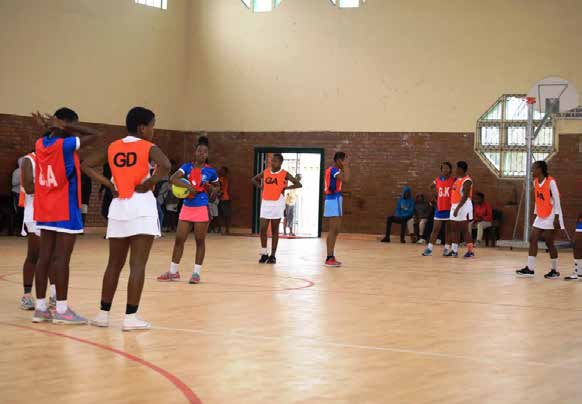 The R1.2 million indoor centre in Nkobongo situated within the KwaDukuza municipality forms part of government’s Comprehensive Rural Development Programme that aims to tackle issues such as underdevelopment, food security, unemployment, poverty and other social ills such as drugs.
The R1.2 million indoor centre in Nkobongo situated within the KwaDukuza municipality forms part of government’s Comprehensive Rural Development Programme that aims to tackle issues such as underdevelopment, food security, unemployment, poverty and other social ills such as drugs.
The indoor centre situated in the KwaDukuza Municipality has been built to accommodate a variety of sporting codes, including netball, basketball and volleyball.
The KwaDukuza Municipality deputy mayor, Dolly Govender, said sport plays a huge role in bringing communities together, developing social capital and reducing crime and anti-social behaviour.
In addition, exercise combats non-communicable diseases such as hypertension, diabetes, high blood pressure and some cancers.
“Health is not just about avoiding disease. It is also about physical, mental and social wellbeing. When a healthy lifestyle is adopted, a more positive role model is provided for other people in the family. Let us use this facility to achieve just that,” she said.
Netball coach Sisanda Shangase said the facility has brought hope to KwaDukuza. She said that the community had a netball team once before, but a lack of facilities meant that in wet or muddy conditions, attendance was poor and eventually, the team stopped practicing.
The chairperson of the municipality’s youth, sports and gender portfolio, John Phahla, said the community must play a central role in safeguarding the centre and encouraging the youth to participate in sport and, if they are good enough, to consider becoming a professional sportsperson.
UKZN astronomers to make history
UKZN astronomers to make history JoyA R70m South African project will allow for the secrets of radio bursts and dark energy to be investigated.
A multi-million rand telescope will generate cutting-edge South African science, stimulate economic and technological development and train students in critical skills.
The ground-breaking Hydrogen Intensity and Real-time Analysis eXperiment (HIRAX) telescope is being funded by the University of KwaZulu-Natal (UKZN) and the national Department of Science and Technology through the National Research Foundation.
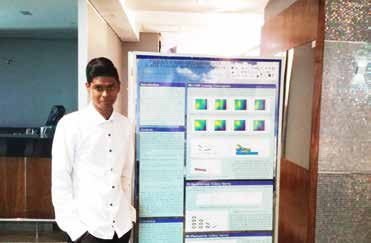 The HIRAX telescope is located at the Square Kilometre Array (SKA) South Africa site in the Karoo and will have important synergies with the 64-dish MeerKAT, the country's precursor to the SKA.
The HIRAX telescope is located at the Square Kilometre Array (SKA) South Africa site in the Karoo and will have important synergies with the 64-dish MeerKAT, the country's precursor to the SKA.
The experiment, which will be managed by UKZN, is the result of a large global collaboration.
The researchers will undertake a technical programme that involves building the instrument, carrying out science observations and analysing the raw data.
The project will work with industry to develop new technology and innovation, such as telescope hardware and big data analysis tools.
HIRAX will be able to determine the characteristics of dark energy during a critical period in the universe, between seven and 11 billion years ago, when dark energy became the central component in the universe.
Science and Technology Minister Mmamoloko Kubayi-Ngubane said HIRAX will enhance the national system of innovation by building research and innovation capabilities in the country.
She said the training of PhD students would contribute to the achievement of the target of 100 PhDs per million people by 2030 and inspire the next generation of learners to enter the exciting fields of science and engineering.
Vuk’uzenzele spoke to Warren Naidoo, who is currently studying towards a Master’s Degree in applied mathematics at the university.
Naidoo is doing his research in cosmology which is the study of the origin, evolution, and fate of the universe. He said the HIRAX project provides students like himself with an opportunity to make valuable contributions to the astronomy field.
“It will give us an opportunity to investigate some of the biggest questions in current cosmology, and that has been a lifelong dream for me,” he said.
VAT relief for households
VAT relief for households vuyelwanWith the cost of living becoming more expensive government is working hard to reduce the financial burdens placed on ordinary South Africans by zero rating of some consumer items.
Zero rating was introduced to provide relief to low-income households, which spend a high proportion of their income on household goods.
Zero rated items do not have the 15 percent Value-Added Tax (VAT) attached to them. They are intended to help South Africans save money. 
There are 19 basic foods that do not have VAT attached to them including maize, samp, rice, brown bread, fruit, vegetables, pilchards and eggs.
Additionally, items such as diesel, petrol and paraffin, as well as certain services including rental accommodation, rail and road transport and educational services, are also exempt from VAT.
In February government announced that it would increase VAT from 14 percent to 15 percent. Government also recognised that poorer households would be placed under more financial pressure.
To ease the rising cost of living Finance Minister Nhlanhla Nene appointed a panel that would produce recommendations on which additional household items should also be zero rated.
Following intensive research and public consultations, the panel recommended that additional items to be added to the list. These include;
■ White bread
■ White flour
■ Cake flour
■ Sanitary products
■ School uniform
■ Nappies
The panel also encouraged National Treasury to ensure that all the benefits of zero rating go to consumers rather than to producers.
 The panel further recommended other ways to help poor households for example by strengthening government programmes such as nutritional support, free provision of sanitary products and social grants as areas where government spending could be increased.
The panel further recommended other ways to help poor households for example by strengthening government programmes such as nutritional support, free provision of sanitary products and social grants as areas where government spending could be increased.
Minister Nene said in his budget vote that government would work to ensure that the poorest of the poor are not hardest hit by the VAT rate.
Water agreement takes centre stage in China
Water agreement takes centre stage in China angenithaAFRICAN leaders were at the forefront of building relations with President Xi Jingping.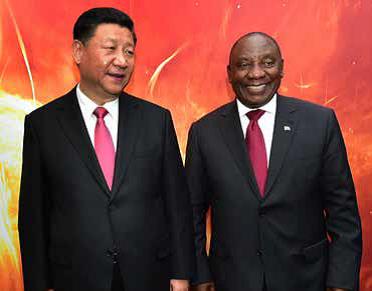
South Africa and the People’s Republic of China have signed a Memorandum of Understanding (MoU) relating to water resources.
The MOU seeks to establish and reinforce co-operation between South Africa and China on the efficient utilisation, management and sustainable development of water resources.
In the agreement the two governments agreed on areas of co-operation.
These include enacting and implementation of water policies, laws and regulations; integrated management and utilisation of water resources; comprehensive river basin planning; comprehensive utilisation of rain water; and planning, designing, construction, operation and maintenance of water-related infrastructure.
The areas of co-operation also include small hydropower development; hydrology and water resources monitoring; groundwater utilisation, protection and management; flood control, drought relief and disaster mitigation; climate change impacts on water resources and countermeasures; coordination and cooperation in international water events; training and capacity building.
The working agreement between the two countries came during President Cyril Ramaphosa’s State Visit to the People’s Republic of China where he co-chaired a two-day Beijing Summit of the Forum on China-Africa Cooperation (FOCAC) with Chinese President Xi Jinping.
President Ramaphosa said the dialogue during the Beijing summit reflects the unique and strategic nature of the partnership between Africa and China.
“Through FOCAC and other forums, China has worked to ensure that Africa’s development is prominent on the international agenda.”
President Ramaphosa said the continent appreciated the decision made by China to provide new funding to African countries to the value of $60 billion and to invest in initiatives in areas such as industrial development, infrastructure, human resource development, health care, the green economy, and peace and security.
President Xi said China stands ready to strengthen comprehensive cooperation with African countries to build a path of high-quality development that is suited to respective national conditions, inclusive and beneficial to all.
FOCAC was formally founded in 2000. Since then, China and African countries have held the 2006 Beijing summit and the 2015 Johannesburg summit, which have promoted cooperation between the two countries.
Wear your skin proudly
Wear your skin proudly JoyLerato Sithibe is a woman living with albinism. She wears her skin proudly not allowing negative stereotypes to define her.
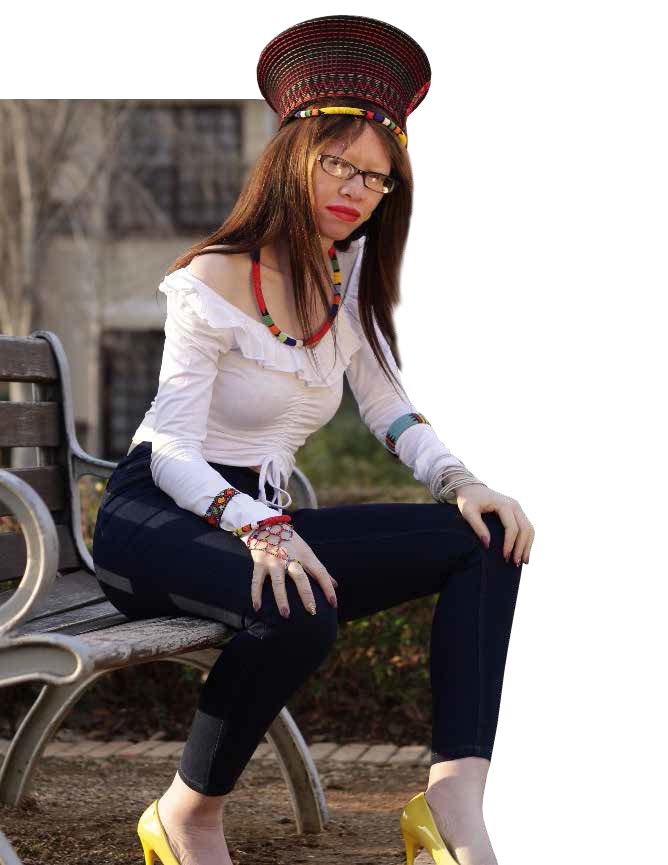 “It is important for people like me not to let others define their identity. Wear your skin proudly because you are wonderfully made,” she said.
“It is important for people like me not to let others define their identity. Wear your skin proudly because you are wonderfully made,” she said.
Sithibe (28) from Kroonstad in the Free State, explains that her condition is hereditary and is the result of a person having a reduced amount of melanin pigment formed in the skin, hair and/or eyes.
“We are not the muthi or aliens people think we are. We are human beings just like everyone else.”
Seithibe wears many hats. She is a model who also uses fashion to raise awareness about albinism and is an activist for people with disabilities in the Free State.
She said she grew up in a loving family that never made her feel different or less loved for having albinism.
“I didn’t understand why my skin colour was different from other people, why every time I went outside people would call me names and stared at me like I was an outsider.”
The stigma attached to albinism made Sethibe more grateful for her family, crediting them for the strong and confident woman she is today.
Some of Sithibe’s proudest achievements include being crowned Miss Free State Albinism 2018 and being chosen as one of the finalists for the Face of Free State Fashion Week 2018.
With September being Albinism Awareness Month Sithibe said she would be happier to see more people with albinism coming out and doing great things in the modelling industry and other sectors.
How should people with albinism take care of themselves?
- Avoid sun exposure during peak sunlight intensity periods (9am to 3pm).
- Wear protective clothing, broad-brimmed sun hats and shirts with collars and long sleeves.
- Use sunscreen on all sun-exposed areas at least SPF 30 and re-apply every two hours when out in the sun.
- Visit your doctor regularly for eye and skin examination.
- Wear sunglasses when exposed to sun.